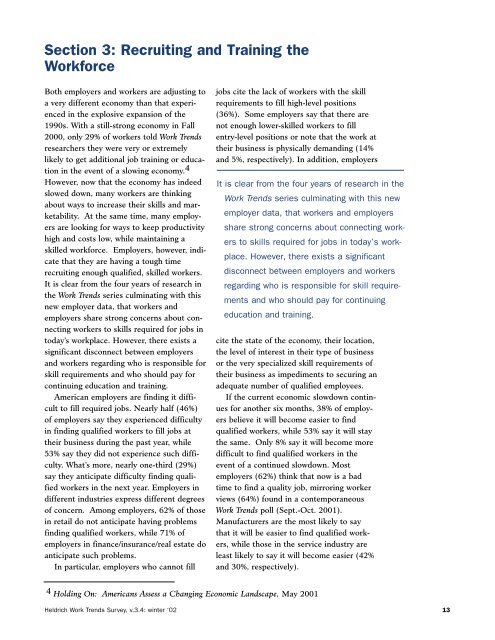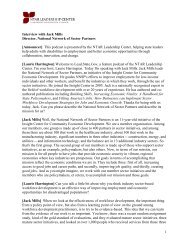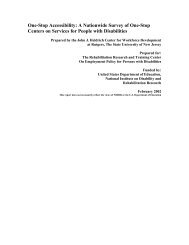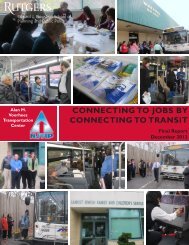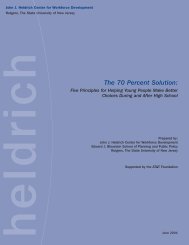Download - John J. Heldrich Center for Workforce Development ...
Download - John J. Heldrich Center for Workforce Development ...
Download - John J. Heldrich Center for Workforce Development ...
You also want an ePaper? Increase the reach of your titles
YUMPU automatically turns print PDFs into web optimized ePapers that Google loves.
Section 3: Recruiting and Training the<br />
Work<strong>for</strong>ce<br />
Both employers and workers are adjusting to<br />
a very different economy than that experienced<br />
in the explosive expansion of the<br />
1990s. With a still-strong economy in Fall<br />
2000, only 29% of workers told Work Trends<br />
researchers they were very or extremely<br />
likely to get additional job training or education<br />
in the event of a slowing economy. 4<br />
However, now that the economy has indeed<br />
slowed down, many workers are thinking<br />
about ways to increase their skills and marketability.<br />
At the same time, many employers<br />
are looking <strong>for</strong> ways to keep productivity<br />
high and costs low, while maintaining a<br />
skilled work<strong>for</strong>ce. Employers, however, indicate<br />
that they are having a tough time<br />
recruiting enough qualified, skilled workers.<br />
It is clear from the four years of research in<br />
the Work Trends series culminating with this<br />
new employer data, that workers and<br />
employers share strong concerns about connecting<br />
workers to skills required <strong>for</strong> jobs in<br />
today’s workplace. However, there exists a<br />
significant disconnect between employers<br />
and workers regarding who is responsible <strong>for</strong><br />
skill requirements and who should pay <strong>for</strong><br />
continuing education and training.<br />
American employers are finding it difficult<br />
to fill required jobs. Nearly half (46%)<br />
of employers say they experienced difficulty<br />
in finding qualified workers to fill jobs at<br />
their business during the past year, while<br />
53% say they did not experience such difficulty.<br />
What’s more, nearly one-third (29%)<br />
say they anticipate difficulty finding qualified<br />
workers in the next year. Employers in<br />
different industries express different degrees<br />
of concern. Among employers, 62% of those<br />
in retail do not anticipate having problems<br />
finding qualified workers, while 71% of<br />
employers in finance/insurance/real estate do<br />
anticipate such problems.<br />
In particular, employers who cannot fill<br />
jobs cite the lack of workers with the skill<br />
requirements to fill high-level positions<br />
(36%). Some employers say that there are<br />
not enough lower-skilled workers to fill<br />
entry-level positions or note that the work at<br />
their business is physically demanding (14%<br />
and 5%, respectively). In addition, employers<br />
It is clear from the four years of research in the<br />
Work Trends series culminating with this new<br />
employer data, that workers and employers<br />
share strong concerns about connecting workers<br />
to skills required <strong>for</strong> jobs in today’s workplace.<br />
However, there exists a significant<br />
disconnect between employers and workers<br />
regarding who is responsible <strong>for</strong> skill requirements<br />
and who should pay <strong>for</strong> continuing<br />
education and training.<br />
cite the state of the economy, their location,<br />
the level of interest in their type of business<br />
or the very specialized skill requirements of<br />
their business as impediments to securing an<br />
adequate number of qualified employees.<br />
If the current economic slowdown continues<br />
<strong>for</strong> another six months, 38% of employers<br />
believe it will become easier to find<br />
qualified workers, while 53% say it will stay<br />
the same. Only 8% say it will become more<br />
difficult to find qualified workers in the<br />
event of a continued slowdown. Most<br />
employers (62%) think that now is a bad<br />
time to find a quality job, mirroring worker<br />
views (64%) found in a contemporaneous<br />
Work Trends poll (Sept.-Oct. 2001).<br />
Manufacturers are the most likely to say<br />
that it will be easier to find qualified workers,<br />
while those in the service industry are<br />
least likely to say it will become easier (42%<br />
and 30%, respectively).<br />
4 Holding On: Americans Assess a Changing Economic Landscape, May 2001<br />
<strong>Heldrich</strong> Work Trends Survey, v.3.4: winter ‘02 13


